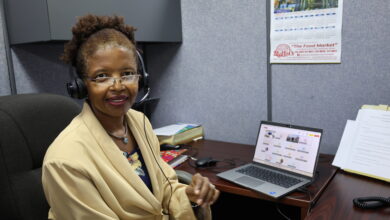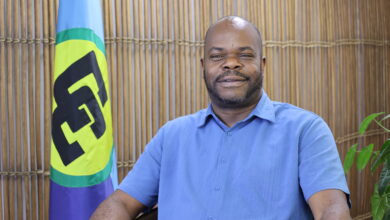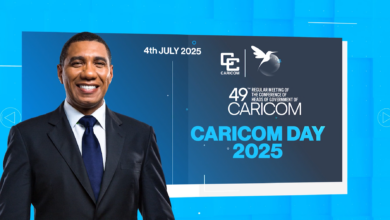(CARICOM Secretariat, Turkeyen, Greater Georgetown, Guyana) I welcome you all to this Inaugural Meeting of the CARICOM-India Joint Commission, and I extend a particularly warm welcome to you Vice Minister R. Swaminathan and your delegation who have travelled from India to be part of this occasion.
This Meeting reaffirms the friendly and cooperative ties between the Caribbean Community and India and the commitment of the two sides to strengthening those ties. A meeting of our Foreign Ministers in the not too distant future would serve to further enhance those relations.
Today’s first sitting of the Commission has been long anticipated. CARICOM and India signed the Agreement on Scientific and Technical Cooperation quite sometime ago followed by the Agreement establishing the CARICOM-India Joint Commission in 2003. That does not mean there has been inaction. Our Foreign Ministers, in 2005, set the framework within which the Commission should function and also identified issues which could serve to strengthen our relationship.
Excellency, the Indian Government is an important partner for the Caribbean Region. With Embassies and High Commissions in four (4) CARICOM States (Guyana, Jamaica, Suriname and Trinidad and Tobago) as well as having an Ambassador accredited to CARICOM, India has well established its presence in the Region. Three Member States, Guyana, Suriname and Trinidad and Tobago, also have diplomatic missions in New Delhi.
CARICOM nationals have benefitted from annual training courses offered to Member States and the Secretariat under the Indian Technical and Economic Cooperation (ITEC) Programme. India has worked with our Member States to enhance their capacity in health, agriculture disaster management and diplomacy. There has been significant collaboration between the Caribbean Agricultural Research and Development Institute (CARDI) and its counterpart the Indian Council of Agricultural Research (ICAR) in battling crop disease.
The Secretariat has also benefitted from India’s assistance. The design and implementation of our Information Technology platform at the Secretariat Headquarters in 2005 was provided by the Indian Government. It has served us well for the 10-year period. I must express my gratitude and appreciation as well as that of my staff for the tremendous difference it has made to our ability to serve our Member States.
I also want to thank India for its agreement to upgrade the systems in the coming year following a visit by a needs assessment team. This upgrade is most welcome. Further your offer to provide capacity-building support to the Secretariat in the areas of project management, monitoring and evaluation, strategic planning and diplomacy will also be of great assistance. Both of these contributions will enhance our capacity in the on-going change management process of the Community.
Our co-operation also affords us the opportunity for collaboration in the international arena. You have mentioned United Nations Security Council reform which, as you are aware, CARICOM Member States support both in the case of numbers and also geographic distribution.
Excellency, in about six weeks time, the first of three global conferences or events to address critical challenges facing not only the Caribbean Community but the International Community will take place. I refer to the upcoming Third International Conference on Financing for Development (FfD) which will be followed by the United Nations Summit for the Adoption of the Post-2015 Development Agenda, and the United Nations Climate Change Conference (COP21) in Paris.
For CARICOM, the issues at all three have a significant impact on our development. The international development financing landscape has not been advantageous to us in more recent times. Designation as middle-income countries means that most CARICOM countries are no longer eligible for concessional development financing. This limitation forces heavy reliance on high-cost, public and private capital financing for our development needs. This criteria which has been imposed by the developed world for extending concessional development financing to small vulnerable states like CARICOM, based as it is on GDP per capita, needs to change.
CARICOM Member States face the additional challenge of building their internal resilience in order to mitigate their inherent vulnerabilities. Even as they do so, they must as well structurally adjust and transform their economies towards the achievement of sustainable and inclusive economic growth. Our Region has continued to feel the impact of the 2008-2009 financial crisis and the burden of high debt and low growth has weighed down our development prospects.
Our countries also face the existential threat of climate change. Our Region has been designated one of the most natural disaster-prone in the world, and the increased intensity of storms and sea-level rise pose particular problems for us. As has occurred in our Region, one climatic event can ravage the infrastructure and inflict damage amounting to more than 100 percent of GDP. As recently as Christmas 2013, Dominica, St Vincent and the Grenadines and Saint Lucia suffered from floods arising from a freak storm which in three hours created havoc across the countries.
Recent events in India demonstrate the global threat posed by climate change. In that regard, I must express my sympathy and that of the entire Caribbean Community on the death of more than 2,000 of your citizens as a result of the on-going heat wave. These unusual climatic events emphasise the need for a global solution to a global crisis.
It is our fervent hope that CARICOM and India can work together towards achieving favourable outcomes for our countries at these upcoming international meetings.
In closing, I am pleased that this Inaugural Meeting of the Joint Commission is finally convened. This meeting allows us to exchange views on ways to enhance bilateral collaboration in various fields and issues on the international stage and strengthen our relations.
It will undoubtedly further the scope of collaboration between the Caribbean Community and India and also pave the way for regular political exchanges at a higher level. In that regard, I look forward to a meeting between our Foreign Ministers as yet another step in strengthening our ties.
I wish today’s discussions every success and look forward to the mutual benefits which they would bring to our peoples.
Photos: https://www.flickr.com/photos/caricomorg/sets/72157653491991719






